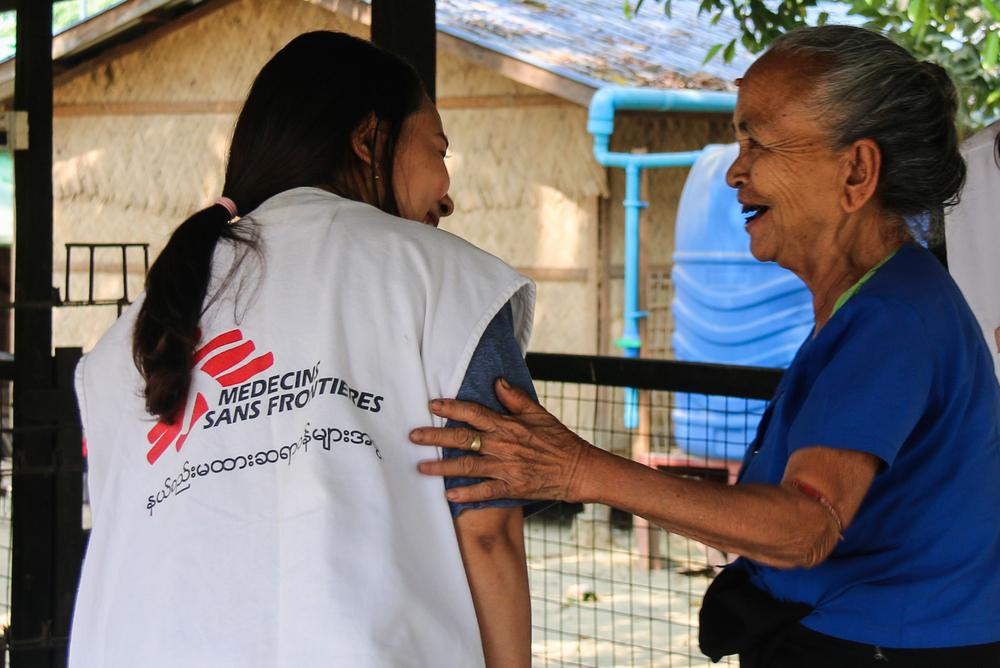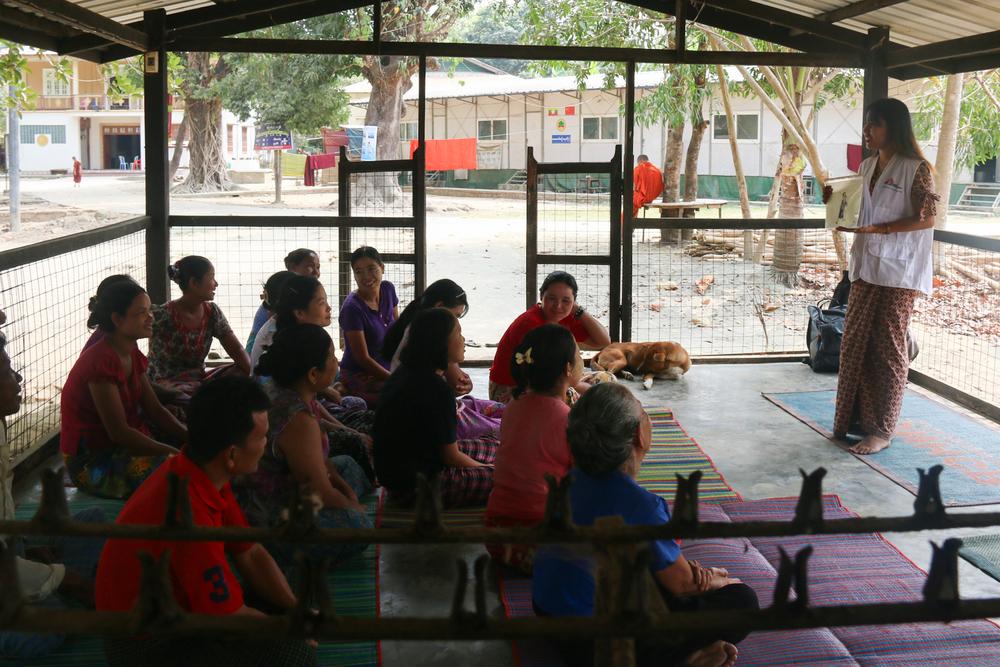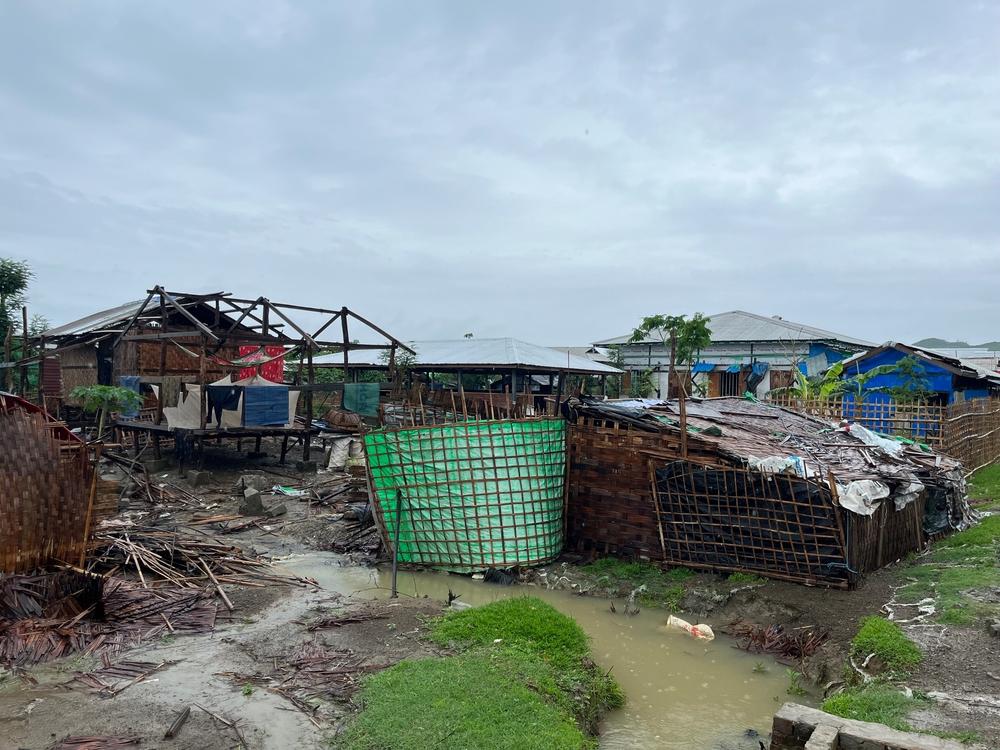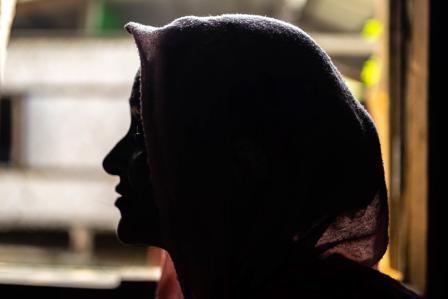Myanmar: Mental health counsellors are more important than ever following Cyclone Mocha

Doctors Without Borders counsellors and community-based health workers provide ongoing support to patients in villages, health clinics, and internally displaced peoples’ camps. This photo was taken before Cyclone Mocha, which has increased the needs for mental health support in Rakhine state. Myanmar, March 2023. © Zar Pann Phyu/MSF
“Patients often say to me that our sessions give them hope for the future. They feel calmer, more positive and better equipped to face the future with our support.”
Cyclone Mocha, with winds of up to 280kmh, ripped through Rakhine state and the Northwest of Myanmar on 14th May. People in these areas are already incredibly vulnerable, most live in bamboo houses and there are around six million people in Rakhine who rely on humanitarian assistance. 26,500 internally displaced people live in camps in the area, a large number are Rohingya, who suffer a high number of mental health conditions due to years of persecution and severe restrictions to their freedom of movement.
Doctors Without Borders / Médecins Sans Frontières (MSF) counsellor educators and community-based health workers provide ongoing support to patients in villages, health clinics, and internally displaced peoples’ camps. Services include psychological education and counselling to help enhance understanding and coping skills for patients (and their caregivers) experiencing a wide range of mental health concerns. These range from depression and anxiety to psychosis, and even thoughts or acts of suicide when people feel completely hopeless.
Working with patients and their caregivers in the environments where they live helps us provide support and counselling that touches patients’ lives at the most critical of moments. Our patients struggle with displacement resulting from ethnic or religious conflicts, sexual assault, and the mental health issues that can evolve from acutely stressful situations where basic resources and healthcare are hard to find and access. We help treat their symptoms and work with them to provide the tools and resources to not just survive but to learn to thrive in the most challenges of circumstances.Sara Chesters, MH Activity Manager
Mental health support is a core part of Doctors Without Borders’s medical work in Rakhine state, but following the recent cyclone, the team have adapted the way they work to improve the care they provide to the affected communities. Instead of a formal, individual approach, which is treatment focused, the teams are currently working on building relationships and allowing people the space to talk.
In the aftermath of the storm, mental health counsellors and community health workers were out every day, accompanying the medical teams to Doctors Without Borders clinics and internally displaced people's camps in Rakhine state. Supporting people in their own communities creates a safe space for people to talk and our teams run small, informal sessions with a focus on listening to support people through difficult times.
“We usually go to monasteries or local villages and hold group sessions. The main message is to tell patients that they are not alone. We try to encourage people that their hopes and dreams can come alive again," said Ei Ngoon Phyo, a mental health counsellor educator.

Doctors Without Borders counsellors and community-based health workers provide ongoing support to patients in villages, health clinics, and internally displaced peoples’ camps. These photo was taken before Cyclone Mocha, which has increased the needs for mental health support in Rakhine state. Myanmar, March 2023. © Zar Pann Phyu/MSF
Ei Ngoon Phyo can empathise greatly with the patients as she too lost her family home to Cyclone Mocha and had to wait several terrifying days until she managed to confirm that all family members were safe. Returning to her village, she found widespread destruction of trees and houses.
“A coconut tree cut my house in half, it was completely destroyed, and we are seeing a lot of patients who also lost their houses and their businesses. There are a lot of patients who need mental health support.”
“After the storm, I met patients who needed psychological first aid and I tried to support them as much as I could. Speaking to the patients was a healing experience for me, encouraging them to think in a certain way, helped me to do so too.”
- Ei Ngoon Phyo's story
Ei Ngoon Phyo, Mental Health Counsellor Educator in Myanmar, shares the story:
Cyclone Mocha developed from the night of May 13th and struck the northern part of Sittwe Township on May 14th afternoon, boasting winds reaching up to 175 mph. After the storm, I could not contact anyone as both power and reception stopped working. Two days after the cyclone, I tried to go back to Sin Tat Maw, where my family was, fearing the worst.
Upon arriving in Sin Tat Maw, I was heartbroken to see my house split in two. I did not know how to comfort my family. It rained a bit after the cyclone and the water leaked. There was nowhere to take shelter. I tried to hide my sadness from my family.
After the storm, my village struggled to get clean drinking water as the sources had become contaminated and many villagers lost their livelihoods because of the destruction of trees and crops. People were really struggling.
In Sin Tat Maw, we had mental health patients receiving treatment and counseling from Doctors Without Borders. The community health workers could not contact Sittwe, and the clinic had not reopened yet, so patients came to me as the only available counselor at that moment. I decided to offer my help.
Most patients from both camp and village were the ones who lost their houses. I listened to many stories about destroyed and roofless homes. They said they could not afford to repair them yet and water was leaking through the roof even though they tried to cover it with tarpaulin. I knew from experience; living under such conditions was extremely challenging. The patients from the camp told me that they were struggling, having experienced past conflicts and now facing annual natural disasters. I provided PFA to the patients that were facing economic challenges after losing everything along with the patients who were taking psychosis medication and had been gradually improving until they became triggered by the trauma of the cyclone.
While providing counseling, I found I began to be healed by my own words. Encouraging patients not to feel depressed helped to improve my own outlook on the situation.
When I got back to Sittwe, Doctors Without Borders provided various forms of support to the staff affected by the cyclone, including opening the office and houses for showers and shelter, charging electronic devices, distributing rechargeable lamps, and offering clothing. Doctors Without Borders also collaborated with a third-party organization called Metanoia to provide essential mental support and counseling for the staff. My fellow counselors and I shared our hardships and experiences, as we had all faced similar situations. I received support from everyone.
Following the cyclone, we organized group-counseling sessions in the community and let them share their difficulties and experiences with each other to improve the mental health of the people. We also listened to them when they came to the clinic. These sessions provide many benefits to patients, letting them learn self-care techniques and to realize they were not alone in this situation. We have seen many patients feeling better, and their conditions improve after participating in these sessions. These activities are crucial, and we hope to see more awareness sessions for the community in the future.

A view of A Nout Ye IDP camp in Pauktaw, Rakhine State. Myanmar, June 2023. © MSF
Following Cyclone Mocha, humanitarian organisations struggled to scale up their activities to meet the new needs. Barriers such as limited access to patients remain, and this has affected our ability to deliver mental health counselling to those who need it.
Our mental health supervisor in Northern Rakhine state has said that they are seeing high numbers of mental health requests following Cyclone Mocha. "We have found that there are huge needs in the community but we are struggling to access many patients who need support."
Doctors Without Borders staff have seen high demand for mental health support, particularly over the last few months, but without more access to patients, high numbers of people are missing out. It is essential that humanitarian organisations can reach and deliver care to communities and be allowed to scale up as necessary.
